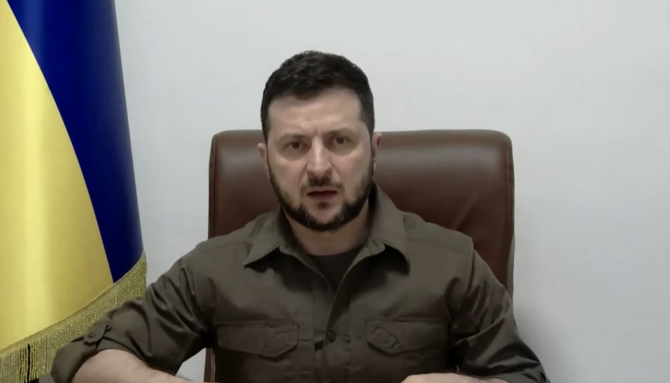NEW YORK: Ukrainian President Volodymyr Zelensky has demanded that Russia be expelled from the UN Security Council. If the body fails to do this, he said that it should be dissolved.
Had the council taken action to deliver effective responses to the conflicts in Syria, Afghanistan, Libya and Yemen, he added, “tyranny would have ceased to exist and peace would have prevailed.”
“It is time to transform the UN system,” Zelensky told council members via video link on Tuesday as he accused Russian forces of carrying out executions and other atrocities in Ukraine. He called for those who committed the acts, and those who gave the orders, to stand trial at a war crimes tribunal similar to the one that took place at Nuremberg after the Second World War.
“The UN system must be reformed immediately so the veto isn’t the right to die. There can be no more exceptions or privileges,” Zelensky said, referring to the power of veto that Russia wields as one of the five permanent members of the Security Council and has used to block resolutions on the conflict in Ukraine.
Zelensky said that civilians had been shot in the back of the head, blown up by grenades in their homes and crushed by tanks while sitting in their cars in the middle of the road.
“They (Russian forces) cut off limbs, cut their throats,” he added. “Women were raped and killed in front of their children. Their tongues were pulled out only because their aggressor did not hear what they wanted to hear from them.”
He warned that the widely reported horrors of war crimes in Bucha are matched by similar atrocities in other parts of the war-ravaged country.
The Security Council was meeting shortly after images emerged of gruesome scenes in the Kyiv suburb of Bucha. They showed the bodies of civilians strewn across the streets, including one person whose hands were tied behind their back, the naked body of a blindfolded child lying on top of other dead bodies, piles of charred human remains, and trenches serving as mass graves. The images sparked outrage and condemnation worldwide.
Russia’s ambassador to the UN, Vassily Nebenzia, said that “to even consider” that Russian troops could commit such crimes is “unacceptable,” as he accused Ukrainian nationalists of staging the horrors in Bucha.
“You only saw what they showed you,” Nebenzia told the council. “The only ones who would fall for this are Western dilettantes.”
He also denied the existence of what his US counterpart at the UN called “filtration camps” where Ukrainians are being stripped of their passports and phones and forced to cross the border into Russia.
“600,000 Ukrainians voluntarily came to Russia and there was no abduction, as Western colleagues claim,” said Nebenzia.
He accused Zelensky of waging a war against the Russian language, saying that Nazis are not only present in Ukraine, “they are also running the show. They have shown unrivaled cruelty against civilians, using them as human shields.”
He added: “We have hundreds, if not thousands, of video testimonials of people who are ready to provide testimonials against Ukrainian cruelty.”
Nebenzia accused Ukrainian soldiers of rape, robbing people at checkpoints, preventing refugees from leaving the country and firing indiscriminately at residential buildings.
He accused Western nations of “not giving a hoot” about Ukrainians. Instead, he said, they are using the people of the country as pawns in their geopolitical games against Russia and prolonging the conflict by sending weapons to the country.
He repeated the official Russian claim that its forces “came to Ukraine to bring peace to the Donbas region,” and vowed that they would “root out the malignant Nazi tumor that is consuming Ukraine and soon about to consume Russia.”
If Russian troops have not advanced as much as might have been expected in their military operations it is because “we are not acting like the US did in Syria, razing entire cities to the ground,” Nebenzia added.
UN Secretary-General Antonio Guterres, who immediately called for an independent investigation into events in Bucha, described the war in Ukraine as “one of the greatest challenges ever to the international order and the global peace architecture, founded on the United Nations Charter, because of its nature, intensity and consequences.”
He added: “We are dealing with the full-fledged invasion, on several fronts, of one member state of the UN, Ukraine, by another, the Russian Federation, a permanent member of the Security Council, in violation of the UN Charter and with several aims, including redrawing the internationally recognized borders between the two countries.”
The ramifications of the war are being felt far beyond Ukraine’s borders, Guterres said. It has led to massive increases in the prices of food, energy and fertilizers, disrupted supply chains and increased the cost of transportation, he added, which are effects that “74 developing countries, with a total population of 1.2 billion people, are particularly vulnerable to.”
“For all these reasons, it is more urgent by the day to silence the guns,” Guterres said.
He urged all countries to ensure markets remain open, resist imposing restrictions on food exports, and make reserves available to countries at risk of famine.
“This is not the time for protectionism,” he added.
He also called for strategic stockpiles of energy and additional reserves to be used to ease the energy crisis in the short term, and stressed that the only “long-term solution” is to accelerate the adoption of renewable energy, “which is not impacted by market fluctuations.”
In terms of financial measures, he urged the G20 and international financial institutions to increase liquidity and fiscal space “so that governments can provide safety nets for the poorest and most vulnerable.”
















